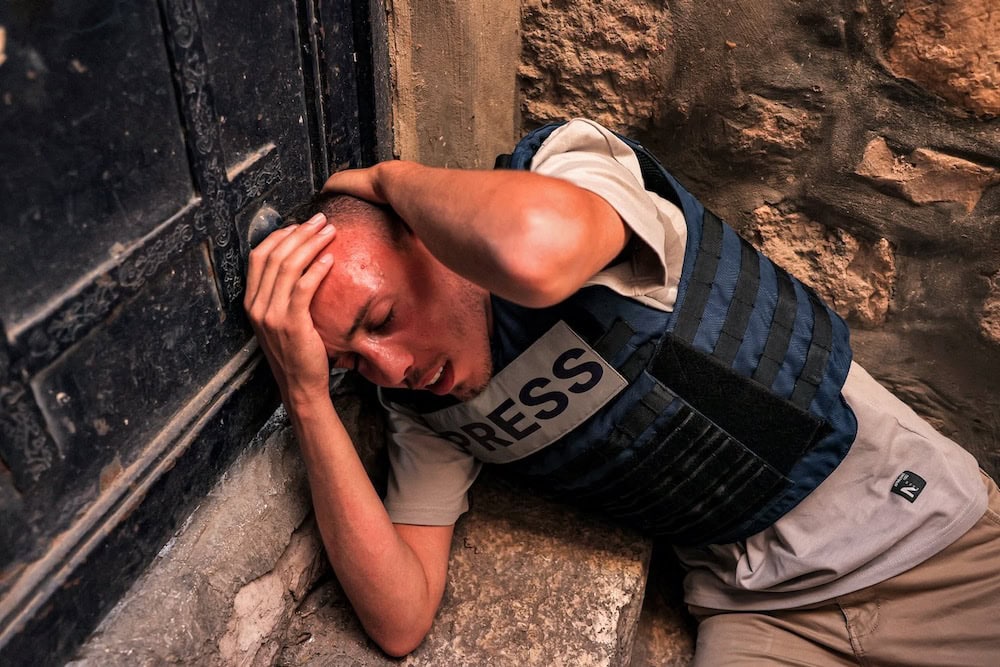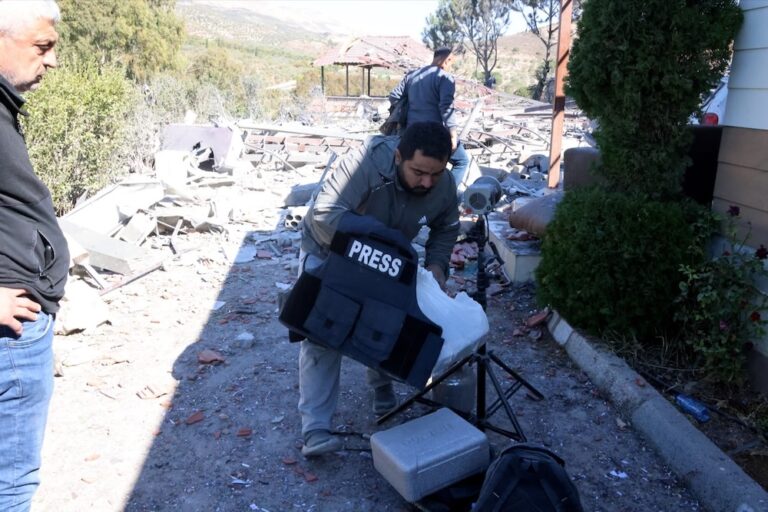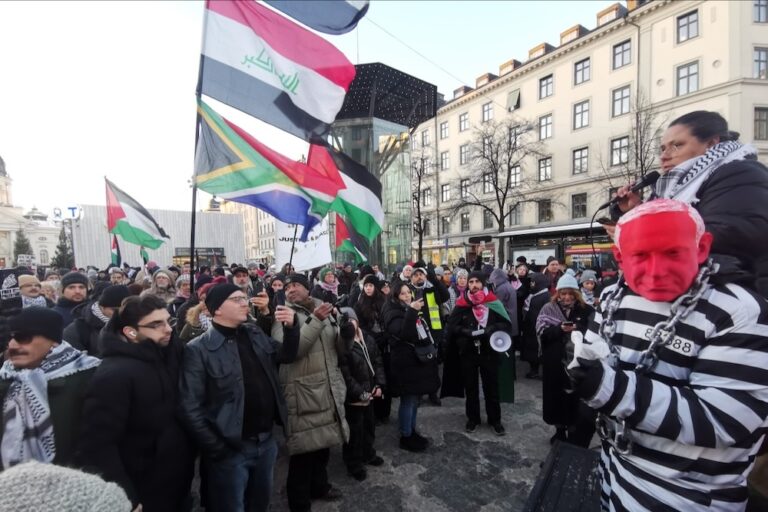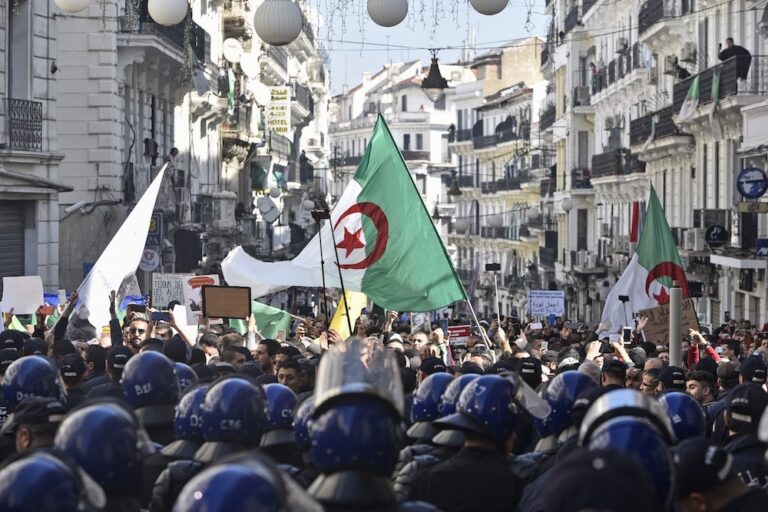June 2024 in MENA: A free expression round-up produced by IFEX's Regional Editor Naseem Tarawnah, based on IFEX member reports and news from the region.
Israel’s lethal drones target Gaza journalists while Palestinian prisoners of conscience are tortured in Israeli jails. Syrian and Sudanese media face escalating repression, while Jordan wields notorious cyberlaw to tighten grip on press freedom.
Palestine: Drone killings, tortured prisoners, and profiles of courage
A UN investigation into Israel’s bombardment of Gaza revealed international laws of war being “consistently violated”, citing Israel’s use of exceptionally powerful bombs and an insufficient distinction between combatants and civilians. As the death toll climbs in Israel’s war on Gaza, the loss of Palestinian civil society leaders, academics and journalists on a weekly basis within the besieged enclave has been staggering.
While 2,000 lb bombs have devastated entire neighborhoods, journalists on the ground have had to also contend with killer drones. According to a revealing investigation from a Forbidden Stories-led consortium of reporters, at least 18 journalists in Gaza have been injured or killed by Israeli drone strikes since 7 October. Despite wearing press vests and being clearly identifiable, journalists like Samer Abu Daqqa have been targeted in the line of duty. With evidence suggesting these precision strikes violate international humanitarian law, concerns have been raised about the disproportionate use of force and the misuse of AI-based targeting systems.
The futility of press vests is also evidenced in another investigation that confirmed the killing of 11 journalists among 80 who received the protective gear from Press House, a shared office and community space in Gaza. Israeli forces also killed Press House director Bilal Jadallah in November, and the building itself was destroyed by an Israeli attack in February. Many journalists told Forbidden Stories they were afraid to wear their vests, often keeping them concealed in their bags and only donning them while reporting live.
Far-right Israeli protesters attacked Palestinian journalist Saif Kwasmi and Israeli reporter Nir Hasson during Jerusalem’s “Flag March,” marking the 1967 capture and occupation of East Jerusalem. The event typically features thousands of marchers terrorising Palestinian residents of the city with racist chants.
In Israeli detention, Palestinian prisoners endure overcrowded cells, inadequate medical care, and systematic abuse. Reports from the Palestinian Prisoners Society detail thousands of arrests since 7 October, including women and children, with widespread allegations of horrific abuse.
In the Occupied West Bank, prominent activist Bassem Tamimi was released from Israeli detention after eight months without trial or charges, along with Aziz Dweik, the Speaker of the Palestinian Legislative Council. Photos of the freed civil society leaders raised alarms about their health and the condition of the remaining detainees. Less than a week after his release, Dweik was arrested again.
After more than four months in Israeli detention without charge or trial, Palestinian human rights defender and lawyer Diala Ayesh remains imprisoned. Israeli authorities recently renewed her four-month administrative detention order. A dedicated advocate for the rights of Palestinian political prisoners within the Israeli military prison system, Ayesh has faced arrests, threats, and harassment from both the Israeli occupation forces and the Palestinian Authority.
During her detention, she has reportedly been subjected to solitary confinement multiple times as punishment for raising concerns about the abusive conditions Palestinian detainees in Israeli prisons have faced since 7 October.
Meanwhile, journalist Maha Hussaini was awarded the Courage in Journalism Award by the International Women’s Media Foundation (IWMF) last month, only to see the organisation rescind the award in response to demands spurred by an online smear campaign targeting the journalist over her social media comments. The situation echoes a similar incident in 2020 when she faced another smear campaign after winning the Martin Alder Prize by the Rory Peck Trust, which stood firm against the pressure.
What sets this time apart is that over the past eight months Hussaini has continued reporting despite losing her home to Israeli bombardment, enduring several displacements, and facing months of starvation and communication blackouts that left her sending her reports via text messages.
Syria’s civil society faces threats within and without
The state of Syrian civil society remains precarious. Despite rare moments of relief, threats persist both within the country and beyond. In Suweida, residents recently celebrated the release of civil rights activist Rita Al-Aqbani from a regime security prison. Al-Aqbani, who worked at the St. Ephrem Patriarchal Development Committee, was arrested on 10 June without a legal warrant and held at an undisclosed location.
Exiled Syrian journalists face a precarious situation in neighbouring countries. As diplomatic ties warm between Bashar al-Assad’s regime and regional leaders, Syrian reporters living in Lebanon, Jordan, Iraq, and Turkey risk the looming threat of deportation back to their home country – considered one of the most dangerous places for media professionals. The Syrian Center for Media and Freedom of Expression (SCM) and RSF have urgently called for their protection, emphasising the grave risks they face if forcibly returned, including arrest, abduction, and potential death.
The case of Syrian refugee and student journalist Atiya Mohammad Abu Salem exemplifies the tenuous situation. Abu Salem was released earlier this month after 50 days of detention in Jordan for attempting to film a pro-Gaza protest near the Israeli embassy in Amman. Authorities also cancelled a deportation order to Syria, deemed illegal by Amnesty International for lacking charges or judicial referral.
In Iraqi Kurdistan, Syrian journalist and RojNews editor Sleman Ahmed was detained for eight months by Iraqi Kurdish authorities on charges of espionage. Arrested last October while entering the Kurdistan Region, Ahmed was accused of conducting “secret and illegal” work for the Kurdistan Workers’ Party (PKK), and denied proper legal representation before May.
On the justice front, accountability efforts progressed last month after the French Court of Appeal validated a historic arrest warrant for President Bashar al-Assad, as well as warrants for his brother Maher al-Assad and two senior Syrian military officials for their alleged role in the Ghouta and Douma chemical attacks in August 2013. SCM praised the court’s decision, affirming that accountability for international crimes overrides claims of immunity, even for sitting heads of state.
“This historic decision marks a crucial step towards justice for the victims of chemical attacks. It sends a clear message that impunity for serious crimes will not be tolerated, and the era when immunity could serve as a shield for impunity has come to an end.”
— Mazen Darwish, General Director of SCM
Jordan’s continued crackdown in response to Gaza
The recent sentencing of Jordanian investigative journalist Hiba Abu Taha to one year in prison under Jordan’s cybercrime law has brought attention to the country’s growing restrictions on freedom of speech and press freedom.
Abu Taha was arrested in May following a complaint by the Media Commission, the government agency responsible for enforcing press laws, regarding her article exposing alleged trade links between Jordanian and Israeli companies amidst the latter’s war in Gaza. Rights groups like the Committee to Protect Journalists (CPJ) and Reporters Without Borders (RSF) have called for her immediate release and condemned the notorious law that has facilitated the increased harassment, arrests, and censorship of journalists.
Authorities have particularly targeted reporters covering pro-Gaza demonstrations or Jordan-Israel relations, using the new cybercrime law to suppress freedom of expression and conduct large-scale arrests of political activists.
One political activist, Mahmoud (a pseudonym) who is also facing charges of “causing strife” under articles of the cybercrime law over his online expression, reported to Social Media Exchange (SMEX) that one of the tweets in question featured a poem.
“I am concerned that the law in Jordan is being used to suppress any free political movement, as the authorities are trying to deter activists by targeting and arresting them,” he told SMEX, adding that a swarm of bots often smear activists on social media.
Human rights groups have decried the arrests campaign that saw at least 1,000 people detained during the pro-Palestine protests between October and November 2023 alone. Those arrested include activists, journalists, and their relatives, reportedly used as leverage to coerce compliance.
In Brief
Sudan continues to witness severe threats to press freedom and journalist safety amid its ongoing civil war. Editor-in-chief Tariq Abdallah of Al-Ahram al-Youm was detained by Sudanese paramilitary group Rapid Support Forces (RSF) without disclosure of his whereabouts. Investigative journalist Muawiya Abdel Razek and three family members were shot and killed by the RSF during a home raid, which the Sudanese Journalists Syndicate called an assassination. In the same week reporter Makawi Mohamed Ahmed and his brother Shamseddine were also killed in an RSF attack on Wad Al-Noura village. The incidents underscore the perilous risks facing Sudanese journalists, prompting calls from CPJ for investigations and accountability.
Iran’s journalists and critics face escalating repression and heightened threats to press freedom and safety ahead of the 28 June presidential election. Blogger and editor Hassan Shanbehzadeh was arrested on espionage charges following a social media post critical of Iran’s Supreme Leader. Journalists Yashar Soltani and Saba Azarpeik were imprisoned for their critical reporting, while Mahta Sadri faced arrest for covering a fatal helicopter crash involving high-profile officials. Nobel laureate and human rights defender Narges Mohammadi was also sentenced to another year in prison for alleged propaganda, sparking international condemnation.
Finally, a new study by Maharat Foundation that monitored media coverage of climate change and environmental issues in Lebanon during January-February 2024 revealed limited attention to these issues. A total of 85 monitored media saw TV coverage account for 53%, newspapers 38%, and online 9%.



